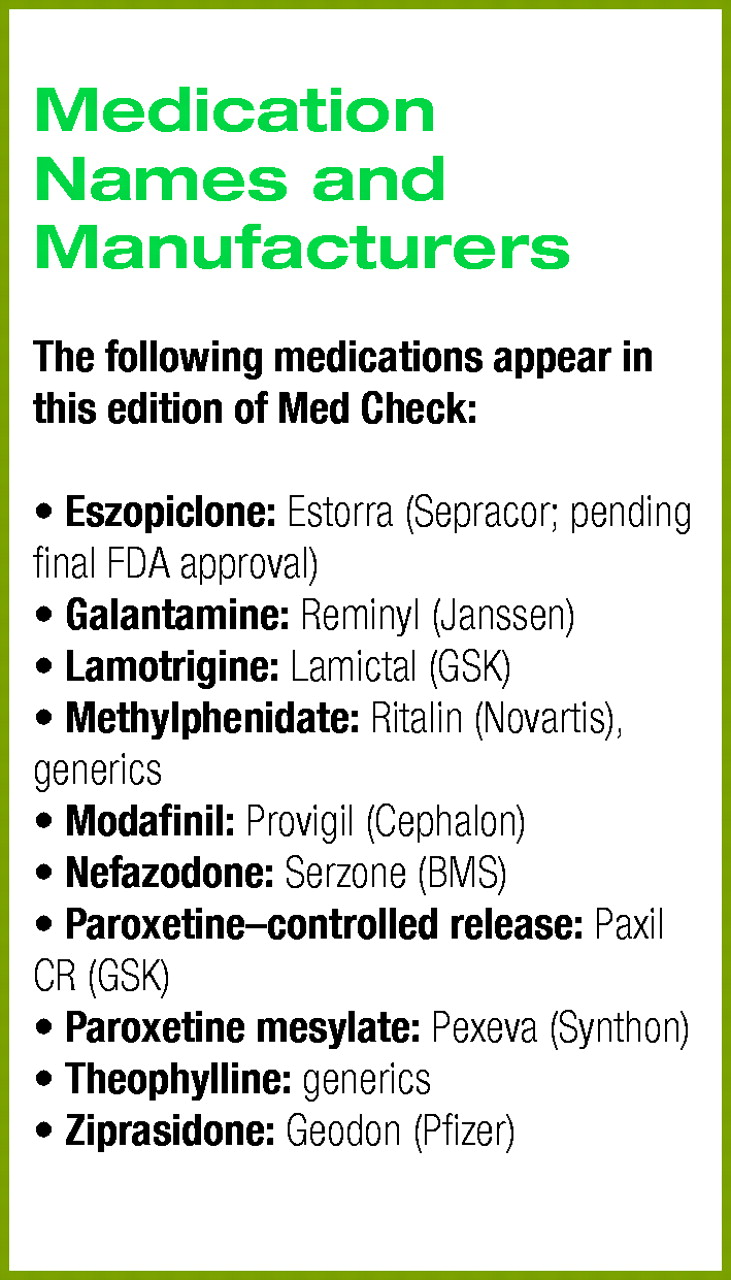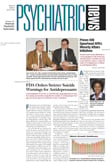Regulatory and Legal Briefs
• Paroxetine–controlled release was approved by the FDA for intermittent dosing for the treatment of premenstrual dysphoric disorder (PMDD). Efficacy was established in a placebo-controlled study of 366 patients in whom both 12.5 mg and 25 mg dosing for the two weeks prior to onset of menses were significantly more effective than placebo in reducing the emotional and physical symptoms of PMDD.
• Eszopiclone won an approvable letter from the FDA for treatment of insomnia. The preliminary approval was the result of a New Drug Application made up of 24 clinical studies, including more than 2,700 adult and elderly patients, and nearly 60 preclinical studies. The new hypnotic appears to be effective at inducing and maintaining sleep through the night and into the early morning without significant hangover effects the next day. Sepracor, which will market the new medication under the brand name Estorra, hopes for final FDA approval later this year.
• Pfizer has submitted ziprasidone to the FDA for relabeling. The Supplemental New Drug Application requests three changes in the product labeling: the lack of adverse effects on blood glucose and lipid metabolism, removal or modification of the strongly worded warning regarding potential heart-rhythm disturbances (none has been documented since the product entered the market in February 2001), and an increase in the therapeutic dosing range. Pfizer hopes for FDA approval by late 2004.
Research Briefs
• Theophylline may be an effective alternative for the approximately 30 percent of children and adolescents who have ADHD and do not respond adequately to traditional stimulant therapy or cannot tolerate its side effects. A xanthine psychomotor stimulant most commonly used as a bronchodilator for the treatment of asthma, theophylline was compared with methylphenidate in 32 children with ADHD over six weeks. No significant differences were seen between the two groups on the Teacher and Parent Rating Scale. Roughly equal improvement was seen overall as assessed by child psychiatrists. The most frequent adverse effects for methylphenidate were headache and insomnia, while stomach upset was the most frequent complaint of those taking theophylline.
J Clin Pharm Ther2004; 29:139-144
• Galantamine is associated with sustained cognitive benefits for at least 36 months in patients with Alzheimer’s disease. In two double-blind, placebo-controlled clinical trials spanning three years, patients taking galantamine declined roughly half as much as did those taking placebo, as measured by the Alzheimer’s Disease Assessment Scale 11-item cognitive subscale, or ADAS-Cog. Patients who discontinued galantamine prior to the three-year point declined at a similar rate before stopping the medication, then declined at the same rate as those taking placebo within a short time of discontinuing galantamine. The most common adverse effects associated with galantamine were stomach upset and insomnia.
Arch Neurol2004; 61:252-256
• Lamotrigine effectively improved depressive symptoms without inducing a switch to mania or hypomania in a one-year, open-label extension study. Of 135 patients completing an acute-treatment trial, 124 entered the extension, including 47 who had received placebo during the acute phase. In the 69 patients (56 percent) who completed the extension phase, significant and sustained improvement was seen on scores on the Montgomery-Asberg Depression Rating Scale. By week 4 of the extension phase, 81.4 percent had achieved remission, and mania/hypomania occurred less frequently than in the 12 months prior to the study’s start. Headache was the most frequently cited adverse event.
J Clin Psychiatry2004; 65:204-210
• Nefazodone appears to be both effective and tolerable regardless of whether a patient has tried and failed another SSRI prior to taking nefazodone. Anecdotal evidence had suggested that recently discontinuing another SSRI increased the risk of a patient’s not responding to or tolerating nefazodone. In a comparison of adults with depression, a group of 13 patients who had not taken any antidepressant in the previous six months was compared with a group of 13 who had discontinued an SSRI within one to four weeks of starting nefazodone, either for intolerable side effects or for lack of efficacy. All patients received open-label nefazodone, 50 mg p.o. b.i.d., and doses were titrated as tolerated to a maximum of 600 mg a day. Patients were followed for 12 weeks. Depression scores in both groups improved significantly; however, no significant difference was seen between the groups. In addition, there was no significant correlation between prior SSRI use and discontinuation of nefazodone for lack of efficacy or for intolerable side effects.
Depress Anxiety2004; 19:43-50
• In Denmark, whether patients are prescribed newer SSRIs or older, less-expensive tricyclic antidepressants does not appear to be based on socioeconomic status. A longitudinal study of more than 305,000 adults without antidepressant prescriptions at the start of the study were followed over five years. The one-year incidence rate of depression was 1.7 percent and increased with age. Depression was more common in those who were female, single, unemployed, and less educated and had lower income. Over the five-year study, a total of 82 percent of those who developed depression were prescribed newer-generation antidepressants, and prescribing did not correlate with socioeconomic status, education, or annual income. However, those who were younger and who were single were more likely to be prescribed an SSRI.
Eur J Clin Pharmacol2004; 60:51-55
• Ziprasidone may effectively increase response to SSRIs in those with SSRI-resistant depression. Ziprasidone, a second-generation antipsychotic with strong effects at the 5-HT1A receptor, is thought to have mood-elevating properties itself. Of 20 patients who had failed to respond to an adequate trial of an SSRI, 13 patients completed a six-week, open-label augmentation study using ziprasidone. Eight of those 13 (61.5 percent) met criteria for response (50 percent or greater reduction in symptoms), and five of the 13 (39 percent) met remission criteria. Ziprasidone was safe, with no cardiac effects and little or no weight gain. The most common adverse effects noted with ziprasidone in addition to an SSRI included fatigue/sedation, sleep disturbance, dry mouth/stomach upset, and restlessness/tremor.
J Clin Psychiatry2004; 65:217-221
• Modafinil may be an effective adjunct treatment for improving global functioning and clinical condition, as well as reducing fatigue in patients with schizophrenia or schizoaffective disorder. In a four-week, open-label pilot study, 11 patients received 100 mg to 200 mg of modafinil a day in addition to their antipsychotic therapy. In assessments by a blinded clinician and the study investigator, patients’ global functioning was rated as significantly improved. Eighty-nine percent of patients rated themselves as clinically improved. Fatigue was significantly improved and tended to influence cognitive function positively. Positive symptoms were well controlled. Adverse events associated with the addition of modafinil included dry mouth and headache, and two patients developed hallucinations. One patient discontinued the study due to inadequate antipsychotic response.
Clin Neuropharmacol2004; 27:38-43

